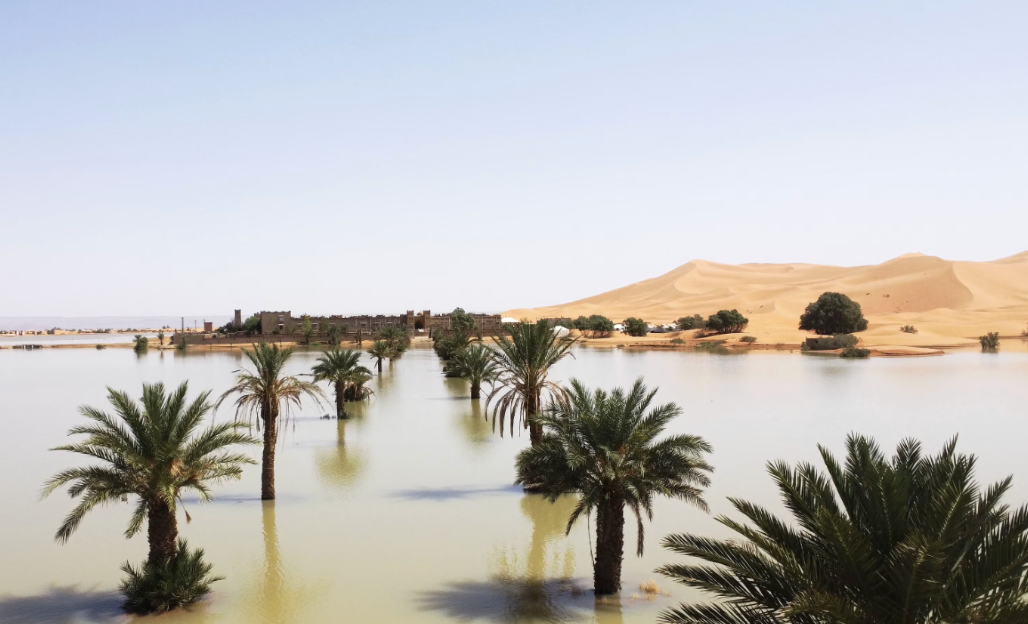In a striking display of nature’s unpredictability, the typically parched Sahara Desert recently experienced an extraordinary meteorological event that left onlookers in awe. Torrential rains, a rarity in this arid expanse, unleashed a spectacular transformation as water gushed through the iconic sand dunes, creating temporary mini oases where nothing but hot baked sand used to stand.
This unusual occurrence not only captivated local communities but also drew the attention of scientists and environmental observers worldwide. The sudden influx of water breathed temporary life into the desert ecosystem, prompting rapid blooms of dormant plant life and attracting various animal species to the newly formed oases. While such flooding events in the Sahara are infrequent, they serve as a powerful reminder of the desert’s hidden potential for dramatic change and the complex interplay between climate patterns and one of Earth’s most extreme environments.
The unexpected precipitation, likely a result of shifting weather patterns, has painted a stark contrast to the Sahara’s normally arid conditions. The onslaught of rain from Morocco gave way to a whole year’s worth of rain poured down in only just two days. According to AP News, meteorologists refer to this phenomenon as an extratropical storm. “It’s been 30 to 50 years since we’ve had this much rain in such a short space of time,” Houssine Youabeb, Morocco’s General Meteorologist, said. The large shift in the environment can be expected by the rain, which could possibly change the Sahara for the next couple of years. With the rain, Lake Iriqui has returned from being just a dry lake bed between Zagora and Tata to now becoming refilled like a recent bathtub. This could cause the return of more general species within the hot and unforgiving desert, making it easier for the survival of many species. However, it’s not the animals taken by surprise, but the humans caught off guard.
The unexpected torrent of water rushing through the typically arid Sahara Desert has left a trail of destruction in its wake, highlighting the region’s vulnerability to such rare weather events. Local communities, ill-equipped to handle sudden flooding, have been grappling with significant damage to homes, businesses, and essential infrastructure. Roads and bridges, not designed for water resistance, have been washed out or severely compromised, effectively isolating some areas and hampering relief efforts. According to NY Post, there have been 20 lives claimed between Morocco and Algeria from the storm along with countless damage done to the crop production. Communication networks have also taken a hit, with floodwaters damaging cellular towers and cutting off vital connections. As the immediate crisis subsides, environmental experts are voicing concerns about the long-term ecological consequences.
The recent flooding in the Sahara Desert, an event as unexpected as it is awe-inspiring, can be attributed to a complex interplay of factors deeply rooted in our changing climate. As global temperatures continue to rise, weather patterns across the world are experiencing significant shifts, leading to more frequent and intense extreme weather events – even in traditionally arid regions like the Sahara. Climate scientists have long warned that global warming would not simply result in uniform temperature increases, but rather in more erratic and unpredictable weather phenomena. This rare rainfall in the desert serves as a stark reminder of these predictions coming to fruition. Human activities, particularly the burning of fossil fuels and deforestation, have accelerated these climate changes, potentially exacerbating the conditions that led to this unusual desert downpour.
In the light of such an extraordinary event, the flooding of the Sahara serves as a reminder of our ever growing climate crisis. As we see more dramatic shifts, we are left with the pressing question: how can we prevent even more severe events from occurring?








